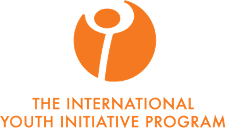Dear Friends of YIP,
We hope this newsletter finds you well.
The Yippies who we were so eager to meet, arrived together with the long-awaited rain. We received both with open arms. Ytterjärna is becoming home to 37 new Yippies. Apart from the course activities, this first month was filled with many dips in the fjord, lots of apple picking and juicing, stunningly beautiful sunrises, supportive hugs and dance evenings.
After a week of Landing and Introduction, the Global Realities block began. The mornings are spent with a Contributor exploring various global issues and the afternoons are focused on practical learning. The Yippies are busy with the Initiative Forum, Internships, Personal Practice, Movement, Gardening and Creative Sessions, including Textiles, Metal Work, Wood Work and Art Therapy.
In this newsletter we would like to share with you how the new Yippies have landed in Ytterjärna and how the first morning courses are experienced. Linse shares about her landing and first week of YIP. Iona explains about the different initiatives we visited in the Local to Global week. Johannes reflects on his experience of the course on Governance and Activism. Lastly, Billy writes about the course on Thinking Like a Mountain: Science, Ecology and Meaning, and Seoyoung shares her comic of the week.
I would like to end by sharing how we started the year. During the Opening Ceremony, Janne and Ami shared a beautiful quote by Rainer Maria Rilke about questions. In education, we often get a lot of answers to questions we never asked. During YIP, the Yippies are encouraged to live the questions that drive them to move forward.
“Be patient toward all that is unsolved in your heart and try to love the questions themselves, like locked rooms and like books written in a foreign tongue. Do not seek the answers, which cannot be given to you now because you would not be able to live them. The point is, to live everything. Live the questions now. Perhaps you will then gradually, without noticing it, live along some distant day into the answer.”
– Rainer Maria Rilke
Written by Tessa van Ruitenbeek
In this newsletter you will find:
– Opening, Introduction and Landing written by Linse Mertens
– Local to Global written by Iona Temple
– Governance and Activism written by Johannes Seeberger
– Thinking like a Mountain: Science, Ecology and Meaning
written by Billy Mills, cartoon by Seoyoung Yoon
– Gardening
– YIP15 Organising Team

Opening, Introduction and Landing

Saturday evening 27/8
I arrived together with Irene at the train station in Järna. Luckily, she was sweet enough to wait for me despite my flight delay, and I did not have to arrive alone.
That evening I met my roomie (aka roommate) for the next ten months, Leila, from Canada.
Sunday
The day of the opening ceremony. In the culture house, we were introduced to our organizing team (OT) and the wider community. This was a very beautiful moment, where each of us received a sunflower during a ritual as a token of welcome. This was also the moment for me to see everyone’s face for the first time. Rilke’s quote about questions was read beautifully, and I knew at that moment that I had come to the right place (see above for the quote). It was a nice, but an intense day (also, learning 40 new names, go figure!).
Monday 29/8
We immediately started with the program. At 7am we got the explanation of what would become the service hour. This is an hour at the beginning of the day where we take up our community tasks, like cleaning, cooking and gardening. This week I was cleaning the common room in our house called Tallevana. I am definitely not a morning person, so this stung quite a bit!
After service hour, we had a communal breakfast and at 8:45am we sang together to start our day. We then set off for a walk through the area. This was a good opportunity to get to know some of my fellow Yippies. After this, we had some time to ourselves and around 6pm dinner was served.
Tuesday
At 7am was our first actual service hour, and after breakfast we got an overview of our curriculum, so we have an idea of what we can expect. After this, we had a sort of sharing circle where we were asked what we would need to land safely in the group, and also what our intentions are for YIP. It was a beautiful moment in which very many individuals spoke very vulnerably about their difficulties and why they wanted to participate in this training.
Wednesday
We got an overview of the afternoon program, which has a more practical focus. There was also a nice explanation of the care structures within YIP, which are in place to ensure that everyone can feel safe in the community. One of the care structures are the check-in groups, where we meet every week to check in about how we are doing. There is also a community meeting every Friday afternoon where this can be discussed with the whole group. Furthermore, with service hour, morning singing, set times for breakfast, lunch, dinner and fika breaks and a more or less recurring week schedule there is a clear rhythm that offers us security. On top of that, we are nourished with healthy food and we live and interact in a beautiful physical space.
Thursday
We talked about the Internship that will take place in March, where we will spend a month within an organization that seeks to create a positive impact in society. One month prior to the Internship, we will organize our Initiative Forum. We have the possibility and responsibility to organize this event ourselves! Later that day, we had our first little check-in in our smaller group, in which I shared that I had a hard time adjusting to the intensity of living together in such a large group. I’m glad I was able to speak very openly about my introverted needs, it felt like a relief.
Friday
We talked about our Personal Practice: a period of an hour and a half each day that we are free to fill in ourselves as a way of self-care. I already feel that this will be sacred to me, and I am ready to exercise myself to apply it consistently! We also talked about our Personal Initiative, a project of our choice that we will present at the end of the year. In the afternoon, we had our first community meeting in which I showed the courage to show and communicate my vulnerabilities that I had shared in my smaller group the day before. I feel very grateful because this opened up the space for people to approach me afterwards, and to start clean conversations. I felt very tired during the whole week being an introvert, because there was not that much time for myself. I felt drained a lot of the time, and could not handle the small talk during meals anymore. It has been a rollercoaster, but I know I made the right choice coming here! My vulnerability has opened the way to a fine first weekend, in which I noticed that many Yippies made the effort to get to know me, and to include me in their conversations and activities. What an intensely difficult, yet beautiful week it was!
Written by Linse Mertens
Local to Global

After our first week of landing, where our days were spent learning the lay of the land and orienting ourselves on the structure of the coming year, we began our first course in the Global Realities module called ‘From Local to Global.’ During this week, we learned about initiatives that are addressing global challenges on the local scale here in Järna.
Our first day began with a lecture by Reinoud on the importance of soil. We talked about how soil is degrading globally and how industrial agriculture is responsible for much of this destruction. We looked at ways that humans can repair and work in harmony with the earth through regenerative agriculture practices and composting. The lecture ended with a reflection on how we often view humanity as a parasite to the earth but that there are many people working to heal and steward the earth. We talked about how we too can participate in this work.
Visiting Skilleby Farm on Wednesday, a biodynamic farm just a few kilometers away from us, we saw this in action. Martin told us that for him, compost is the harvest of his work, the insurance of a future. The vegetables are a byproduct of the work of stewarding an ecosystem. In biodynamic farming everything works together, and the job of the farmer is to encourage this wholeness, Martin told us. The challenge of a farmer working the same land for over twenty years is to continue practicing openness and finding new ways to encourage the ecosystem to become more and more diverse.
After Reinoud’s lecture on Monday, Nigel Wells from the local initiative Virbela Ateljé led us through the rest of the day and introduced us to Flowforms and the nature of water. Flowforms are beautiful ceramic structures that mimic meandering streams and work with the nature of water to aid in cleaning it and enriching it with life. All our grey and black water is processed using these Flowforms and a series of ponds with different plants and algae that clean it and eventually return it to the Baltic Sea.
Tuesday we learned about two initiatives, Vidarkliniken and the Ekobanken. Ursula Flatters, a physician who helped found and run the Vidarkliniken until it closed in 2019 when the Swedish government outlawed anthroposophical medicine, told us her moving story of becoming a physician. Healing, she said, is about being in dialogue with the patient and reaching into that person’s destiny. Healing is about being attentive and understanding and being with people when they need it. It’s about listening and respecting what the patient chooses. And health is about being integrated with the world and in relationship with one’s body, spirituality, and mission. After our time with Ursula we went to the Vidarkliniken and learned about its history and the intentionality behind the architecture: the warmth and windows that encourages patients to heal with the beauty of the natural world outside.
The Ekobanken is a bank in Järna that finances projects that align with the values of being ecologically, socially, and culturally healthy. 97% of monetary transactions are purely financial, meaning no goods or services are traded. Ekobanken invests in projects that are bringing tangible value to the world. Kristoffer Lüthi explained that Ekobanken exists in the current banking system to prove that an alternative, more conscious way to work with money exists.
We spent Thursday learning about curative education both from Mats-Ola and Gérard. We learned about how their two respective initiatives are working with people who have special needs and abilities. Both initiatives are beneficial for all who live and work there and revolve around meaningful work with food and agriculture and relationship-building.
We spent the last day of the week learning about the Kulturcentrum on campus and the incredible care and meaning that went into the stained-glass windows that light the amphitheatre. We then performed improvisation dance on the large wooden stage and with that ended our week, leaving us grounded and ready for the coming week of ‘Governance and Activism.’
It was really inspiring for me to see different ways people are contributing positively to the world. Even though I will never be able to solve all the world’s problems, there are ways to work and exist that have real, meaningful impact. Through these various initiatives and meeting the people who work there and run them, I was inspired to begin thinking about how I can find my place to contribute too.
Written by Iona Temple

Governance & Activism
with Gerald Häfner and Tracey Abenaa Osei-Tutu
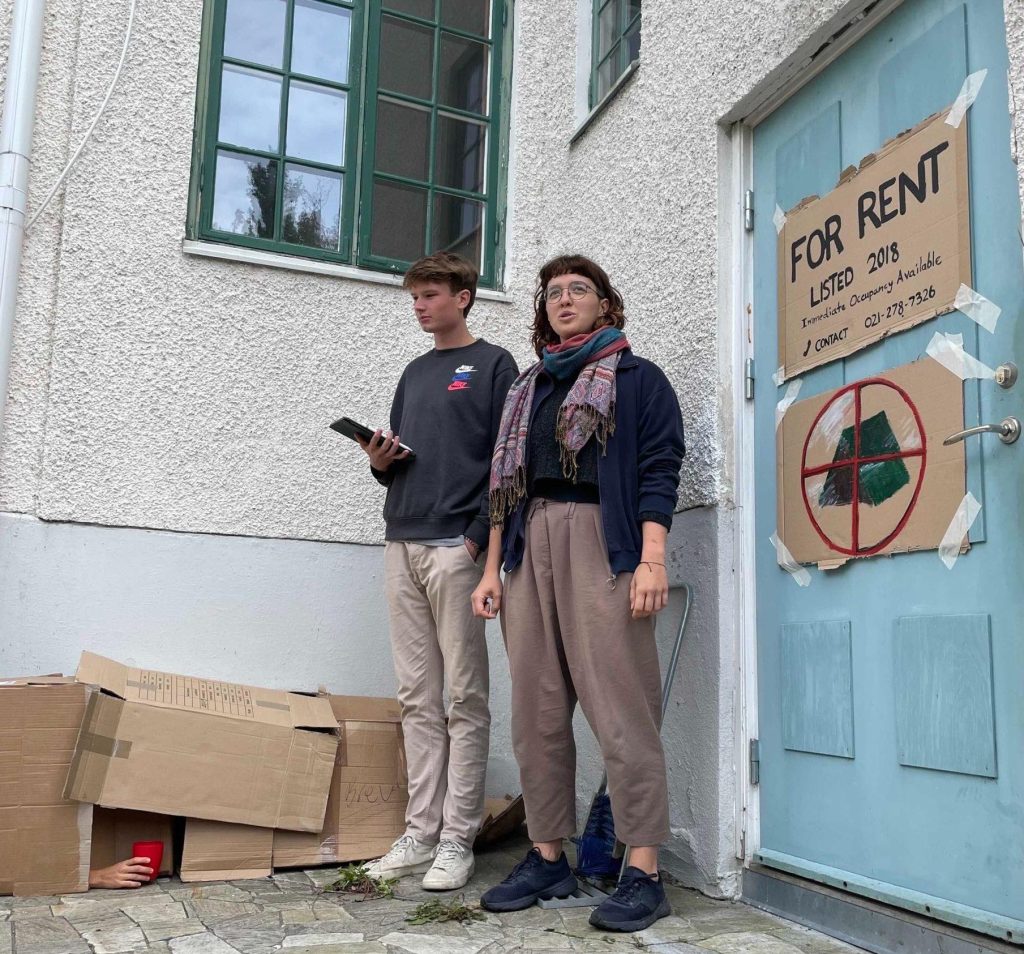
How should decisions be taken in 50 years?
We discussed this question on the first day of our week about Governance & Activism. Soon the realisation came that we cannot envision the future when we are too focused on what we like or dislike in the present.
The first out of two contributors for this week was Gerald Häfner, co-founder of the German Green Party, and former member of the German and European Parliament. He said that if we do not want to make decisions out of a mindset from the past we need to be able to imagine the future.
How did humanity develop?
We started our journey with the wholeness of paradise, a state of all-oneness where everything is connected. The moment Adam and Eve ate from the tree of knowledge, individualism was born. The curiosity for knowledge, for understanding the world, disconnected the human being from its surroundings. Now humanity is trying to find a new form of unity where there is also a place for the individual.
On a governmental level, we moved from theocracy to monarchy and we are now reaching the borders of democracy. It is getting harder to represent many individuals by a handful of politicians. We talked about direct democracy as a way to let everybody step into responsibility, with the aim to be of service to the whole.
For the second half of the week we were joined by Tracy Abenaa Osei-Tutu, a young artist and activist. We played a privilege game, organised an open mic and several mock-protests, like a sit-in and a demonstration. Tracy shared that for her, activism is not only about marches and blocking streets. Growing your own garden can also be a form of activism.
At the end of the week we tried to envision the future. We looked at aims for ourselves and for others and we tried to imagine new ways of governing and educating.
The week left me feeling inspired by all of Gerald’s stories and Tracy’s young energy. I could clearly see that our everyday acting really has an impact on this world.
Written by Johannes Seeberger
Thinking Like a Mountain: Science, Ecology & Meaning
with Dr. Andy Letcher
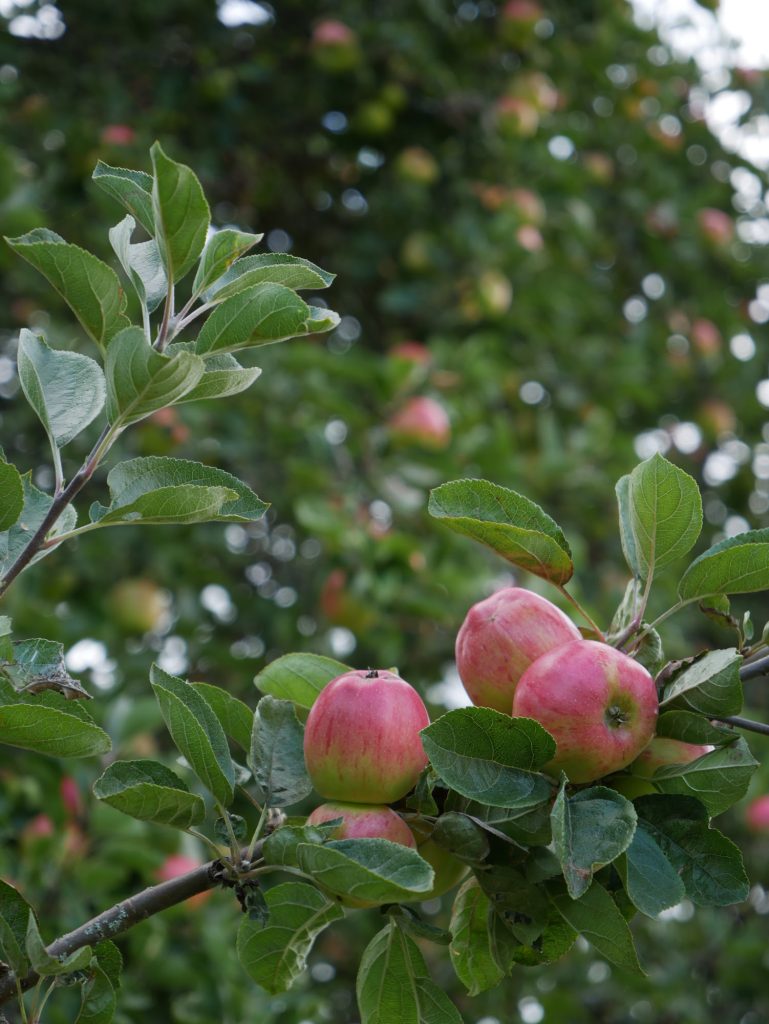
For the fourth week we were joined by Dr. Andy Letcher, program lead of the Engaged Ecology Master’s program at Schumacher College. We looked at the state of the earth and learned about tipping points, the Anthropocene, extreme biodiversity loss and the role of keystone species in ecosystems. We explored reductionism and its limits, and through the lens of systems theory, complexity theory and animism we looked at more holistic ways of seeing the world.
I found the part about positive and negative feedback loops really interesting. To demonstrate the theory, we watched a video of someone walking on a slackline. The moment the person passed “negative” (i.e. leaned too much to one side), (s)he had to outbalance by leaning extremely towards the positive side. This made it very difficult to come back to a stable position. The video made me think about the state of our environment and I realised that environmental degradation is a really serious problem.
The chair game we played was another observation test for me. We started with enough chairs to have one chair per person and gradually chairs were removed from the room (until only 3 were left!). The task was to make sure that everyone was on a chair. The exercise made me feel physically that the less chairs you have, the more difficult it is to get the same number of people on a chair. It was a fun and clear way to demonstrate that habitat loss decreases the number of organisms that live in a certain place.
Andy also spoke about the reductionist way in which science looks at the world. To understand the whole, science breaks things down into its smallest constituent parts. This way of thinking showed to be very useful when we tried to invent a smoothie maker. Holism, on the other hand, studies the relationship between the parts and the whole. I realised that my views are very much scientific and I want to try to start looking at the world in a more open, holistic way.
Written by Billy Mills
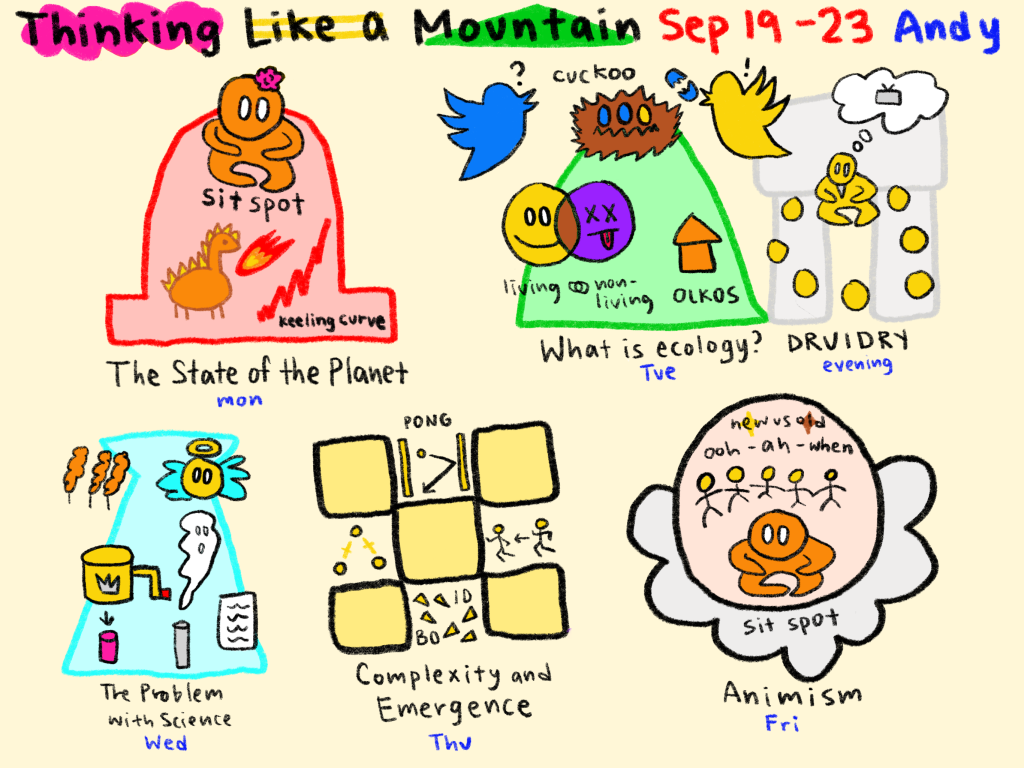
Gardening

In the afternoons of ‘Thinking like a Mountain’ week, we were active in the garden. We harvested pumpkins, cabbages, beetroots, tomatoes, courgettes and cucumbers. We made sauerkraut with the cabbages and pickles with the cucumbers, so we can enjoy our harvest throughout the year. We also picked and juiced many apples growing on campus. At the end of the week, we had meals full of nutritious vegetables and pumpkins decorated our dining space.

Organising Team of YIP15
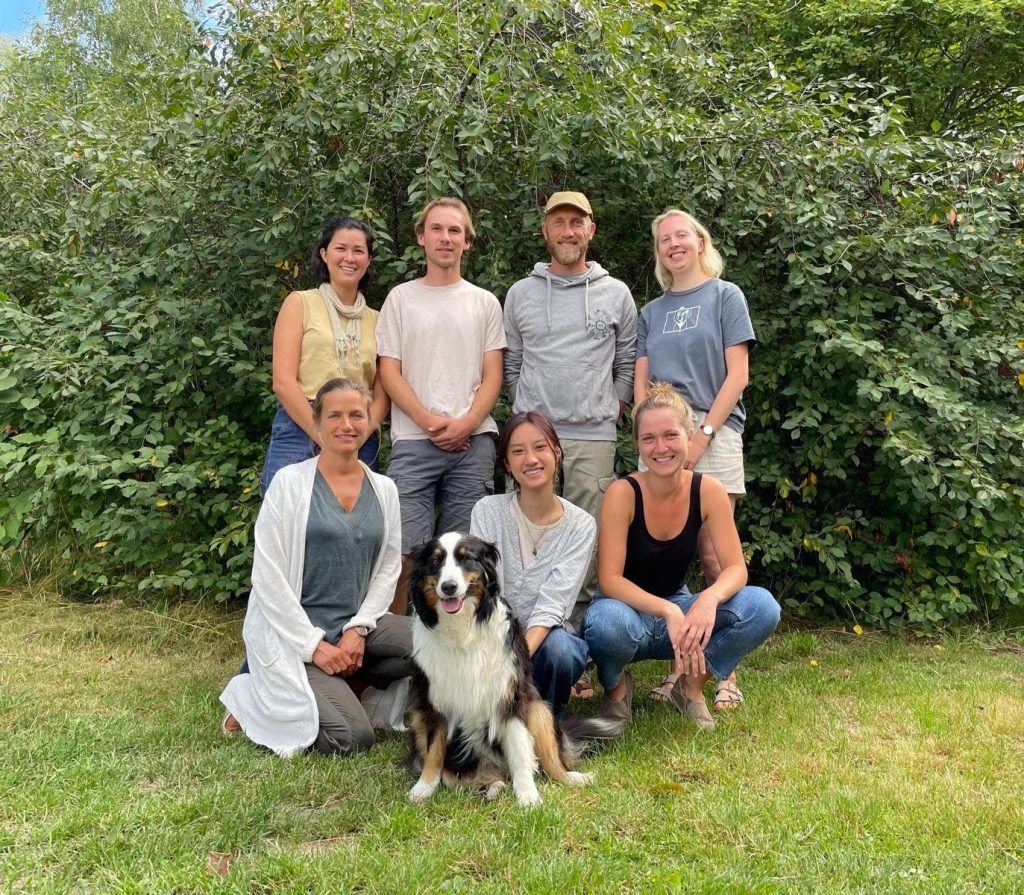
This is the organising team of YIP15! We also have Alice and Katha as our team members who are not in the picture. Alice is looking after the garden and Katha is supporting us in the kitchen, sharing her knowledge and passion for wholesome living food.
You can get to know them more by clicking here.
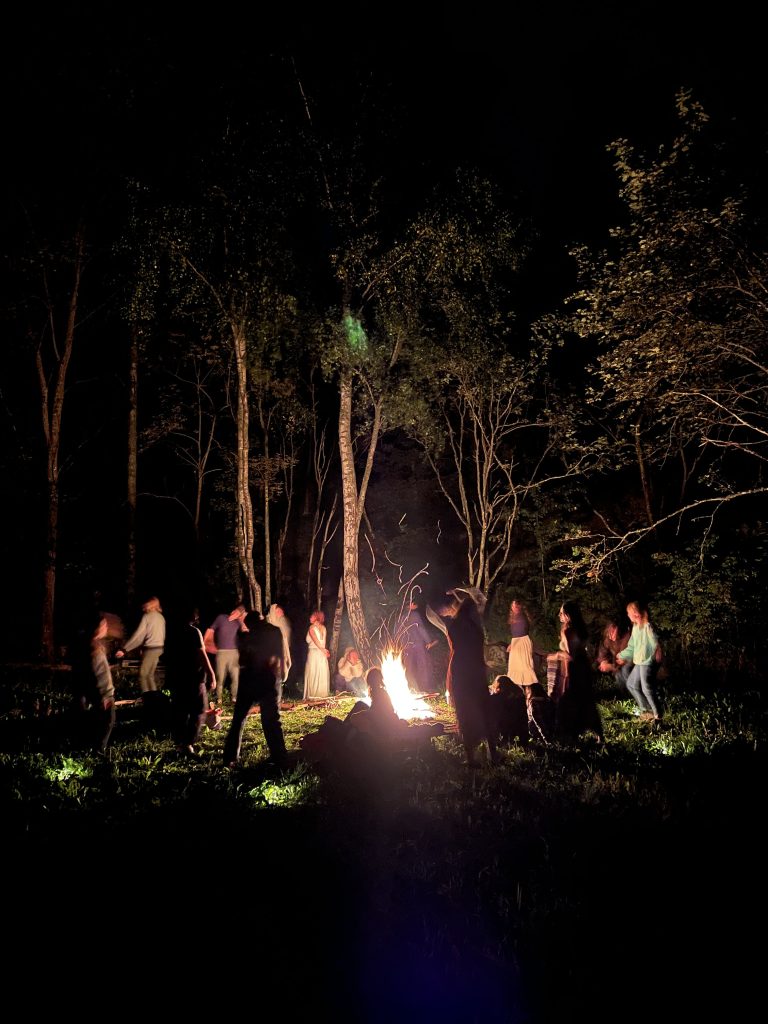
In the Next Newsletter you will find:
– Being Human in a Technological Age
– Values and Economics
– Beyond Narratives: War & Conflict
– Art of Hosting and Harvesting Conversations that Matter
